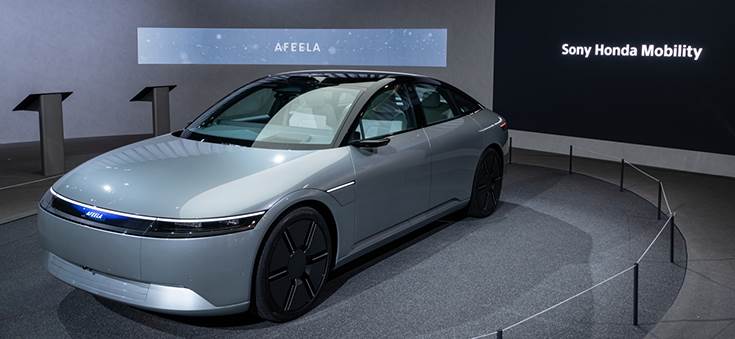Elektrobit, the wholly-owned, independently-operated subsidiary of Continental, today revealed it is a provider of software and services for the Sony Honda Mobility (SHM) Afeela prototype EV revealed at CES 2023 last month. The new Afeela brand EVs are slated to enter commercial production in 2025.
It’s the latest result of Elektrobit’s multi-year collaboration with Sony and now SHM to reimagine the software-defined vehicle. The partnership began in 2019 around the development of the first two Sony Vision-S prototype vehicles.
Elektrobit says it created the innovative software architecture for the Afeela prototype, enabling SHM to leverage the entire Sony ecosystem to create a new level of user experience. Elektrobit developed the cockpit system for including software for the Qualcomm high-performance computing (HPC) processors and the software stack up to the UX design powering all cockpit displays. In addition, Elektrobit provided integration services for the cockpit system encompassing all software and hardware components and applications from Sony and its partners.

Pushing the innovation envelope with software-defined vehicles
The Afeela represents a sea-change in how vehicles are designed, with software playing an increasingly important role, both for core vehicle operation and as a way for carmakers to innovate. Software takes centre-stage in the Afeela prototype cockpit, allowing Sony to integrate its latest audio and camera sensor technologies as well as an incredible array of gaming, movie and music content. SHM also announced a partnership with Epic Games, opening up an array of experiential possibilities which can be brought to life within the cockpit system.
“We’re extremely proud to be the strategic software partner of Sony Honda Mobility on its groundbreaking Afeela prototype project,” said Maria Anhalt, CEO, Elektrobit. “Together with SHM, we are redefining mobility around the vision of creating a new more inspirational and emotional type of user experience. Software is the starting point of this. There is an immense amount of computing power packed into this car which creates all kinds of user experience possibilities, and it challenged us to meet a new level of demands in terms of systems architecture. As a result, we have been able to play a much more central role in this project than in a traditional OEM to supplier relationship and the Afeela prototype really highlights the potential benefits of this shift towards a software-first mindset.”
